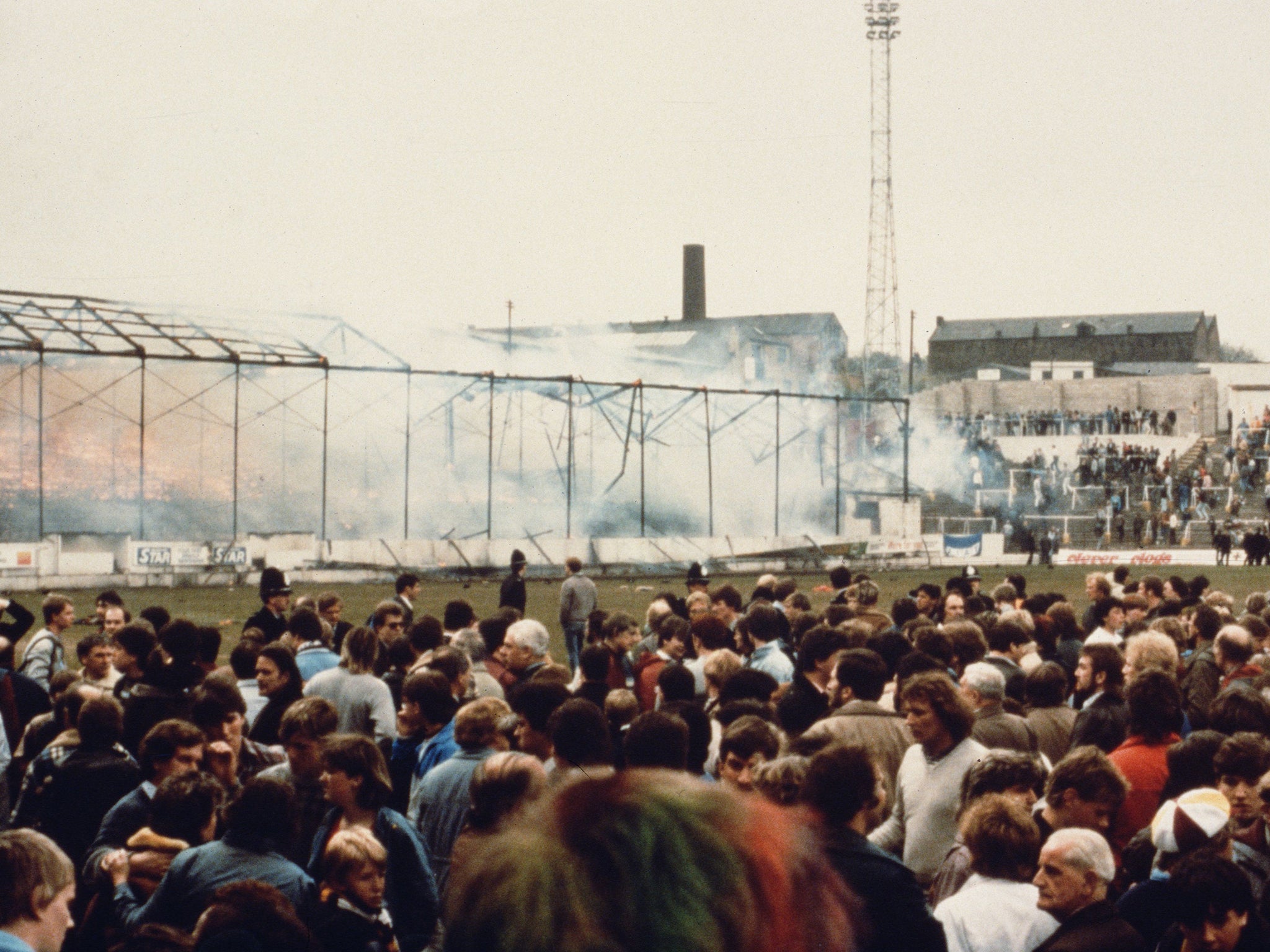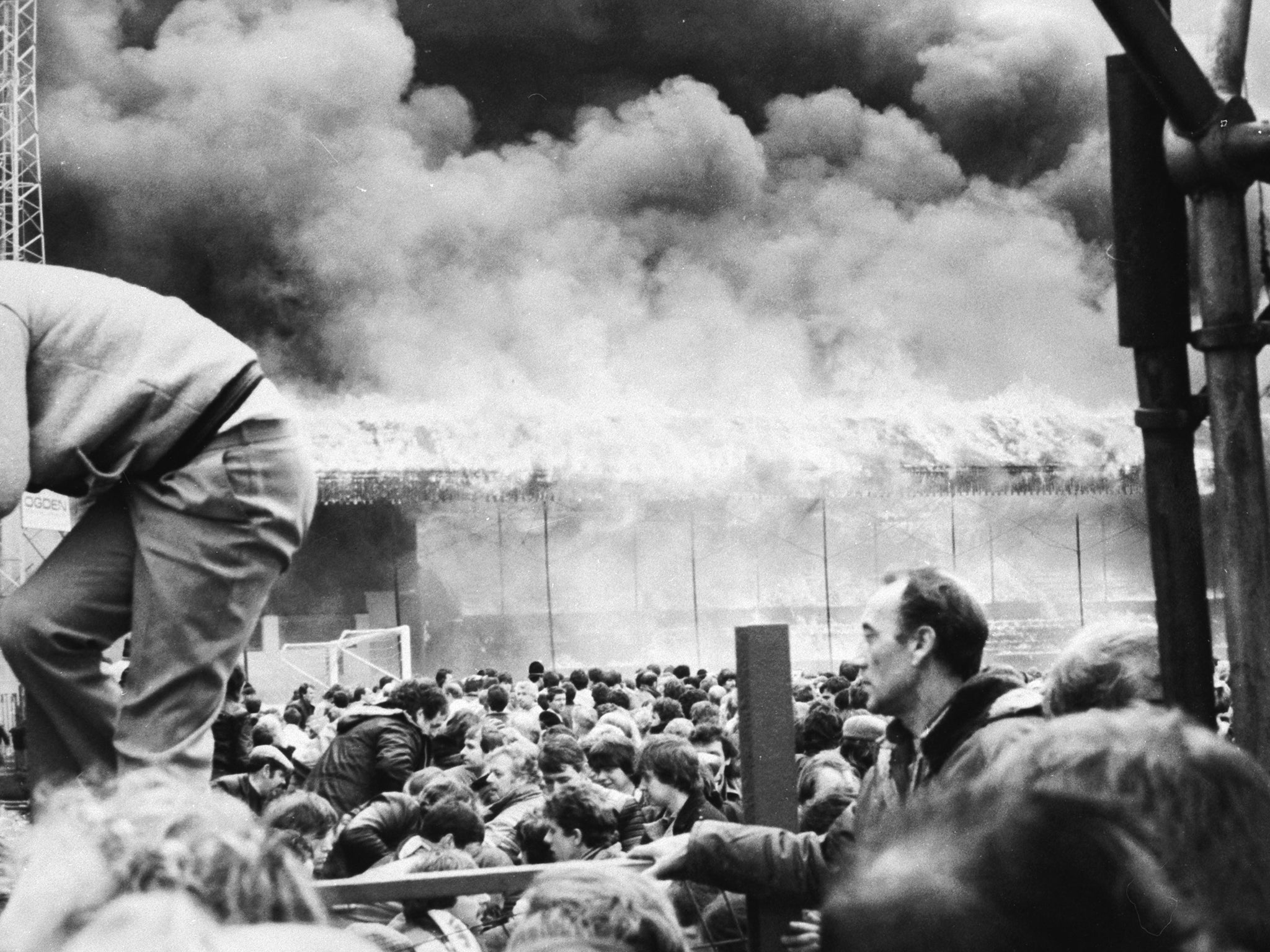Bradford City stadium fire: ‘Police were to blame’ for most life lost in tragedy
Lawyers press Home Secretary May to launch new inquiry into fire that killed 56 supporters in 1985

Your support helps us to tell the story
From reproductive rights to climate change to Big Tech, The Independent is on the ground when the story is developing. Whether it's investigating the financials of Elon Musk's pro-Trump PAC or producing our latest documentary, 'The A Word', which shines a light on the American women fighting for reproductive rights, we know how important it is to parse out the facts from the messaging.
At such a critical moment in US history, we need reporters on the ground. Your donation allows us to keep sending journalists to speak to both sides of the story.
The Independent is trusted by Americans across the entire political spectrum. And unlike many other quality news outlets, we choose not to lock Americans out of our reporting and analysis with paywalls. We believe quality journalism should be available to everyone, paid for by those who can afford it.
Your support makes all the difference.The Home Secretary, Theresa May, has been told that Bradford City fans were wrongly held responsible for deaths in the stadium fire on 11 May 1985 which killed 56 people, in an echo of the way that Liverpool supporters were blamed for the Hillsborough disaster four years later.
A letter from lawyers Leigh Day to May, seen by The Independent, argues that police accused supporters of being slow to respond to their pleas to evacuate the main stand where the fire began, when photographic evidence demonstrates that the affected sections of it were largely empty by the time officers began their evacuation on to the pitch.
The lawyers, who have urged May to initiate an independent review of the evidence, argue that “police failures caused most loss of life” and that the force’s allegations that “people obviously panicked” were “groundless”. The accusation that fans failed to move – made by Andrew Collins QC, counsel for the public inquiry into the tragedy in his opening statement in June 1985 – was “a foreshadowing of the attempt to blame Liverpool fans for the Hillsborough disaster”, May is told.
The lawyers argue that the impugning of fans, which was not challenged at the inquiry, illustrates the flawed and superficial examination of evidence in the original five-and-a-half-day investigation into the disaster, which concluded that the blaze was caused accidentally when a dropped cigarette ignited rubbish below the wooden stand.
Leigh Day point out that the inquiry was convened so hastily that there were no lawyers representing the families of the victims to cross-examine the testimony of West Yorkshire Police, Bradford City, West Yorkshire County Council – which had public safety responsibilities – and the Health and Safety Executive. The only legal representation for families was what Leigh Day call the “ad hoc” role of a barrister instructed by the Bradford Law Society, who questioned only 22 of the 76 witnesses – “and then only to a limited extent”.
In a 20-page letter, the lawyers argue that the inquiry’s lack of intellectual and investigative rigour meant that there was no consideration of what they claim were serial flaws in the police response. Those include the alleged failure of the commanding officer, Chief Inspector Charles Mawson, to investigate radio reports of a fire until his deputy prompted him; an alleged delay of three minutes 15 seconds before the evacuation on to the pitch; and the alleged failure of the police control room in Bradford city centre to meet three police radio requests for fire brigade back-up. This meant the brigade, stationed three minutes from the stadium, did not arrive until nine minutes after the fire had broken out.
West Yorkshire Police have admitted to Leigh Day and fire survivor Martin Fletcher, whom they represent, that there were failings and have referred themselves to the Independent Police Complaints Commission.
The letter argues that the West Yorkshire force failed in a duty to inform Sir Oliver Popplewell, the High Court judge who presided over the inquiry, of at least eight fires in premises owned by or connected to the then Bradford City chairman Stafford Heginbotham, who died in 1995. This, despite the fact that the pattern of blazes was contemporaneously known both by Bradford residents and the local media. A report by the investigative journalist Paul Foot, published in the Daily Mirror of 31 May 1985, headlined “Fire Jinx in Bradford”, is cited to May.
But the demands for a re-examination of the evidence stretch well beyond the Heginbotham issue, which features in a book by Fletcher, who lost his father, brother, uncle and grandfather to the fire. The detailed case laid out for May charts how the assumption that a cigarette caused the fire is, at least, questionable given expert evidence heard by Popplewell.

She is also told that a stadium licensing system recommended after the Ibrox disaster in 1971 – which the then Labour Government enshrined in law in 1975 – had not been implemented.
Leigh Day cite inquiry QC Collins’ own admission in 1985 that the initial fire investigation – which lacked the reconstruction undertaken after a 1981 Dublin nightclub fire killed 48 or the King’s Cross fire, which claimed 31 lives in 1987 – had been rushed. Collins admitted that the police “have not had time or manpower to see everyone who may have something of value to contribute to this investigation… which may help to explain material matters”.
The lawyers conclude: “While we recognise, of course, that these events took place 30 or more years ago, it is evident both from the ongoing inquest into the deaths of 96 football fans at the Hillsborough stadium in 1989 and from the recently commenced inquiry into child sex abuse that the passage of time does not preclude a robust, comprehensive and impartial investigation.”
May has said she will consult with other Government departments before responding “in due course”. The West Yorkshire police said last week that they had not considered criminality as part of their investigation – an astonishing admission. They admitted that they took the contents of Fletcher’s work on Bradford very seriously. A charge of “gross negligence manslaughter” had been available back then but was disregarded.
Join our commenting forum
Join thought-provoking conversations, follow other Independent readers and see their replies
Comments